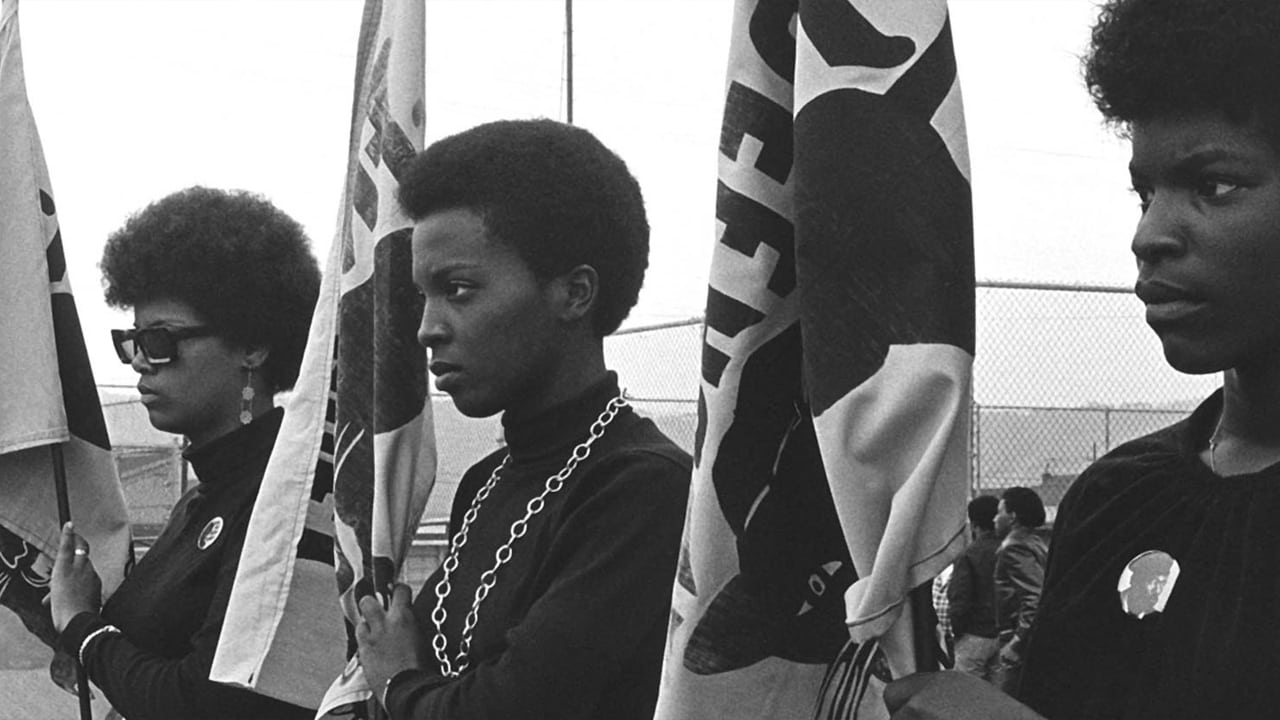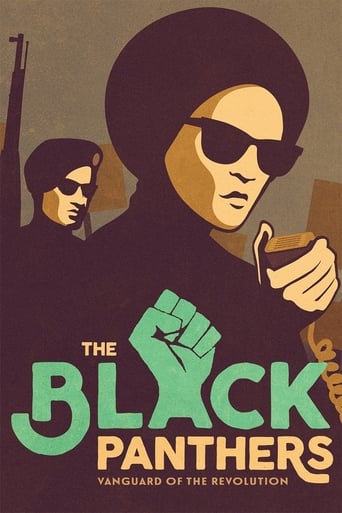Hellen
I like the storyline of this show,it attract me so much
Huievest
Instead, you get a movie that's enjoyable enough, but leaves you feeling like it could have been much, much more.
ChicDragon
It's a mild crowd pleaser for people who are exhausted by blockbusters.
Lidia Draper
Great example of an old-fashioned, pure-at-heart escapist event movie that doesn't pretend to be anything that it's not and has boat loads of fun being its own ludicrous self.
Goingbegging
This is a film to rally the faithful. But it needs more than that to justify the sub-title 'Vanguard of the Revolution', when we're looking at a movement that was fatally split in half through conflict between its leaders, in the style of most far-left groups, and which has effectively ceased to exist. "We were making history" enthuses one supporter. Hmm...True, director Stanley J. Nelson Jr. has made quite a strong case that the split was skilfully and secretly provoked by the FBI under J. Edgar Hoover, who openly declared the Panthers to be a prime threat to national security. But there's nothing new about divide-and-rule, and a united party leadership ought to be proof against it.One philosophical survivor of the movement sums it up well in an ironical post-mortem. "The strength of the Panthers was its ideals and its youthful enthusiasm. The weakness of the Panthers was its ideals and its youthful enthusiasm." At times, the movement can look like a dress-rehearsal for the Nation of Islam, with its solemn drill parades. At others, it just looks like hooligans on the rampage. Those seeking to be convinced by cogent and consistent argument are liable to come away disappointed. "I'm important enough to be arrested. I'm a real Panther now." says one of its senior officers, as though he was fourteen years old. And when Bobby Seale fails to be elected mayor of Oakland, the Panthers cry "He's going to be OUR mayor!" Finally, you're better not looking too closely at Cleaver and Newton. Especially Cleaver, who went careering round in circles, and ended up as a right-wing Republican, voting for Reagan.
paul2001sw-1
What can you do when the system is biased against you? You can resist. Who is drawn to resistance? The young, the restless, those not yet powerful even by the standards of their own communities. What good does violent resistance do? Maybe not much directly, but it helps re-frame a debate in which otherwise the powerless are ignored. The Black Panther Party was a movement established to protect the interests of black Americans in the 1960s. On one hand, they were terrorists whose mandate was self-given; on the other, they really inspired the communities in which they were embedded, to whom the police were just the mightiest local mafia. They combined a message of self-help, pride, the demand for justice, protection and revolutionary fervour; at their worst, they advocated murder (and in return, members were literally murdered by the cops) and (near the end) raised money from drug dealing. Their charismatic leaders ultimately fell out with one another; their eloquent speeches remain compelling today. This documentary, featuring interviews with many surviving Panthers, is a bit one-sided; we don't hear from those within the community who did not approve (there surely must have been some), or (say) from the families of police officers hurt by Panther violence (only from those cops who still take pride in the violence they dealt out). But the sense of anger at the everyday injustice perpetrated on black Americans that drove the Panthers' formation is clear. Ultimately the Panthers had nowhere to go; their last significant act was in electoral politics, both admirable and yet strangely unambitious for an organisation that had been committed to the overthrow of the government of the United States. Of the Panthers' three most famous members, two are dead, one having become addicted to drugs and the other having become a Republican. But Bobby Seale still lives as a community activist in the Bay Area. And for all the problems, this documentary leaves one (mostly) impressed by what he tried to do.
David Ferguson
Greetings again from the darkness. Black lives matter. We hear the phrase frequently these days, and director Stanley Nelson (Freedom Summer) takes us back 49 years to the beginning of the Black Panther Party, and then walks us through the rise and fall. Rather than the usual textbook approach that focuses on the famous photos of angry black men wearing leather jackets and berets while toting firearms, this is a much more comprehensive look at the complexities of the organization and its members.The familiar names of the Black Panther leaders include Huey Newton, Bobby Seale, Eldridge Cleaver, Kathleen Cleaver, Elaine Brown and Fred Hampton. Despite the fact that first hand interviews weren't possible with the big three – Newton and Cleaver are no longer living, and Seale declined the opportunity, there are some fabulous video clips and photographs, many of which have been rarely seen.It's the interviews with former Black Panther members that provide the most insight. Their stance is that the original plan was a non-violent approach to bring attention to police brutality and the lack of equality in Black America. Many social programs were started to assist kids and the poor, but things turned more aggressive when the passive approach didn't yield the desired results. Newton studied the laws and realized open carry was permitted on public property, and that's where most of the famous photos originated.The segment on J Edgar Hoover's counterintelligence plan for the FBI to do what was necessary to prevent the expansion of the Black Panthers is one of the film's best. Hoover even described them as "the greatest threat to the internal security of the country" (yes, this was during the Vietnam War). He was especially concerned about the rise of a "messiah", and that led to what most consider the assassination of Illinois chapter leader Fred Hampton while he slept.Oakland is widely accepted as the central hub of the Black Panthers, and it was surprising to learn that "most" members were teenagers and a majority were female. The interviews with the former members are fascinating and void of any pomp or bluster … just matter-of-fact recollections. What really stands out is just how media savvy the leaders were. They understood how to get headlines and bring attention to the issues.We also learn that Jane Fonda hosted fundraisers and meetings, and we see a clip of Marlon Brando supporting the Black Panthers. These celebrities brought legitimacy to the organization, but didn't stop the fracture that occurred when Huey Newton and Eldridge Cleaver began feuding over the best direction. Seeing clips of Bobby Seale running for Mayor of Oakland in 1972 certainly brought a contemporary feel, as the black voter registration drives continue to this day.As one of the former members states "making history" was "not nice and clean". We learn that more than 20 former Panthers are still in prison today, and the parallels between the mid-60's and the movement for equality today are undeniable. Director Nelson offers an informative education without preaching or romanticizing the Black Panthers.
daretostruggledaretowin
*May contain spoilers, but not really* The first thing that struck me about this film was the absence of talk about revolutionary theory or even tactical practice. With a name like it has one might think it would unpack the nuanced and much debated term "vanguard" a little more. The influence of Mao Tse Tung thought is completely absent apart from a sign that says "Chairman Mao says: Free Huey," which is never explained or even mentioned. Primarily the film tells the story of what happened, but does not explore motivations, expectations, hopes, dreams or rationale any more than is necessary for a cursory tally of events.However, it is actually an entertaining film for precisely that reason. There are guns, there is action, there is insanity; or more properly put, allegations of insanity. Actually, the film is pretty sensationalistic. If you're a radical interested in an analysis of the BPP this is not the place to look. I get the sense that the interviews in the film are brutally chopped up.My favorite part of the film was also my favorite part of BPP history and that is Fred Hampton's work in Chicago and his resulting assassination by agents of the state. The film actually does make a pretty good case for why Hoover's FBI, the Nixon administration and the cops in Chicago considered him dangerous. However, one of the strongest arguments for his perceived danger from the state (and I do think it was justified) is the eloquence of his speeches and clips of these speeches are sadly lacking. One my favorite speeches is the one where he says: We've got to face the fact that some people say you fight fire best with fire, but we say you put fire out best with water. We say you don't fight racism with racism. We're gonna fight racism with solidarity. We say you don't fight capitalism with no black capitalism; you fight capitalism with socialism.We ain't gonna fight no reactionary pigs who run up and down the street being reactionary; we're gonna organize and dedicate ourselves to revolutionary political power and teach ourselves the specific needs of resisting the power structure, arm ourselves, and we're gonna fight reactionary pigs with INTERNATIONAL PROLETARIAN REVOLUTION. That's what it has to be. The people have to have the power: it belongs to the people.In the film this speech was cut off after the first two sentences.Additionally, the film focused solely on what was going on with the Panthers at the time and completely obfuscated the context of the time. It made mention of white allies but it did not talk at all about the Weather Underground, for example, who issued a "Declaration of War" against the US government in response to the assassination of Hampton and subsequently bombed multiple government buildings.Like I said, this is an entertaining movie and some parts are even inspiring, but if you're looking for the definitive story of the Black Panther Party, this is not the place.

